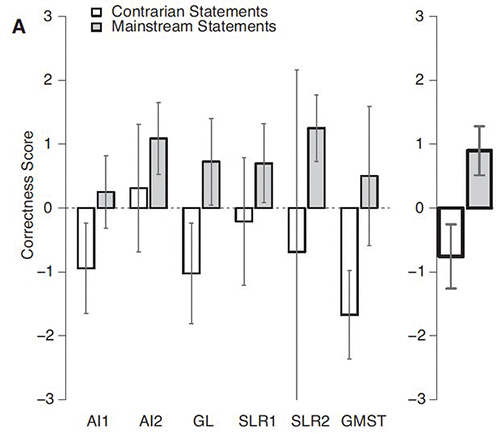Climate denial arguments fail a blind test
Posted on 23 May 2016 by dana1981
As we saw in the recent legal ruling against Peabody coal, arguments and myths that are based in denial of the reality of human-caused global warming rarely withstand scientific scrutiny.
In a new study published in Global Environmental Change, a team led by Stephen Lewandowsky tested the accuracy of some popular myths and contrarian talking points sampled from climate denial blogs and other media outlets. The scientists searched the blogs for key words related to Arctic sea ice, glaciers, sea level rise, and temperature to identify the most popular arguments. Not surprisingly, they found some common myths:
nearly two-thirds of all mentions of temperature on the three top contrarian blogs included a claim of “cooling”; and likewise more than a quarter of all mentions of arctic ice alluded to its “recovery”, and so on.
Using their search results, the authors put together language that was representative of the most common arguments made on the climate denial blogs about these subjects. To ensure that their example arguments accurately depicted contrarian claims and rhetorical techniques, they also consulted climate experts, who confirmed their representativeness. Interestingly, the climate experts identified many of the same mistakes that my colleagues and I found in our 2015 study attempting to replicate climate contrarian research (cherry picking data, for example).
The authors then used the same data and arguments as the contrarian blogs, but changed the climate variables to something related to economics, and presented them to economists and statisticians:
For example, the [glaciers] scenario pairs the claim that “our country’s rural population is growing, not shrinking” with a figure that showed the change in population for numerous individual villages, akin to a figure depicting the mass balance of individual glaciers.
In addition, an alternative statement was constructed for each scenario that summarized the mainstream scientific interpretation of the climate data, again translated into economic or demographic terms (e.g., “almost all of the rural regions of the country are losing population”).
The tests involved common contrarian myths that:
- Arctic sea ice surpassed 1989 levels in 2009;
- Arctic sea ice “rebounded” in 2013;
- Glaciers are growing, not shrinking;
- Relatively cool temperatures in the US, China, and Russia in 2009 told us something meaningful about global warming;
- Global sea levels didn’t rise from 2003 to 2011; and
- Global sea levels rose faster in the early 20th century than in recent decades.
In every case, the economists and statisticians found that the mainstream statements were more correct than the contrarian statements, which in most cases they found to be incorrect or misleading, and hence unsuitable for policy advice.

Mean correctness scores and 95% confidence intervals for expert economists. Any negative value indicates that a claim was judged to be incorrect or misleading, whereas any positive value indicates that a claim was found to be accurate or in accord with the data. Illustration: Lewandowsky et al. (2016), Global Environmental Change
In a similar previous study, Lewandowsky found that economists thought the notion of a “pause” in global surface warming was “misleading and ill-informed” when the temperature data were instead labeled as agricultural output. This was a particularly important test, because the pause myth has become the basis of most arguments against taking action to curb global warming, despite the fact that any temporary slowdown in global surface warming is now over.
In short, economists and statisticians find climate contrarians’ interpretations of data and associated arguments to be misleading and wrong. As the paper concludes:































 Arguments
Arguments






























Remove the political context and just deal with numbers. Good one.
"Remove the political context and just deal with numbers."
Snort! Good one there Barry.
Never mind that AGW dinial is all about politics, not numbers.
Denial of the occurrence of irreversible rapid climate change and ocean acidification and warming just shows lack of understanding of physical principles and the available evidence. Denialists, of course, often have vested interests that inhibits their seeking to gain understanding. For example, here in Australia, we have politicians who are denialists, presumedly because they believe that it will get them votes.
Another issue is what measures should be implemented to cope with the situation as best as physically possible. Australia has a small population so any measures to reduce greenhouse gas emissions will have insignificant impact, despite policies to encourage solar and wind systems. It would be better if the focus was on issues to cope wth the consequences of climate change, such as sea level rise.
Australia has a small population so any measures to reduce greenhouse gas emissions will have insignificant impact
Same goes for many countries. Collectively, a bigger impact. If every country dropped out of mitigating CO2 emissions on the same argument... so see it as a collective issue, not nationally self-serving. Atmospheric CO2 is borderless.
It would be better if the focus was on issues to cope wth the consequences of climate change
Why not focus on both? Reducing emissions means less to deal with later on.